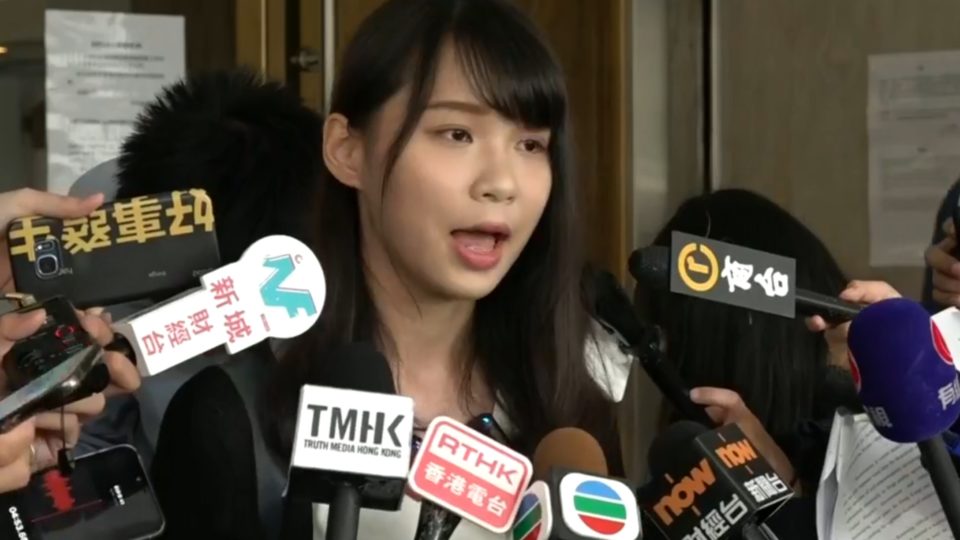A Hong Kong High Court Judge today ruled that last year’s disqualification of pro-democracy activist Agnes Chow from running for LegCo was inappropriate, overturning along with it the results of the by-election ultimately won by fellow pro-dem Au Nok-hin.
In his ruling, Judge Anderson Chow said that the decision by an election official to bar the Demosisto candidate — based on the official’s assumption that her advocacy of self-determination for Hong Kong made it impossible for her to uphold the Basic Law — was inappropriate, and that the candidate should have been given an opportunity to defend herself.
“In my view, even if the Returning Officer considered that she had clear and cogent evidence that Ms Chow did not genuinely and truthfully intend to uphold the Basic Law and pledge allegiance to the HKSAR, she should still have given Ms Chow an opportunity to refute such evidence and explain her position with a view to persuading the Returning Officer to come to a different conclusion,” the ruling reads, before going on to invalidate the result of the by-election.
“The right to be heard is an important procedural safeguard which should not be lightly displaced.”
In its decision to ban Agnes Chow from running, the government had suggested that self-determination of the sort espoused by Chow opened the door for advocacy of Hong Kong independence, which is a red line for Beijing.
As such, the government ruled, such a stance “is inconsistent with the constitutional and legal status of HKSAR,” and someone who “advocates or promotes” self-determination or independence cannot uphold the Basic Law, which holds that Hong Kong is an “inalienable” part of China.
However, Chow was not given an opportunity to respond to that assertion, or to offer her own definition of “self-determination” as she understood, something that the judge noted in overturning the decision. He did not, however, challenge the underlying authority of election officers to rule on a candidate’s eligibility for office.
Chow was running on an explicitly anti-Beijing platform, running a dramatic campaign ad that vowed to resist the mainland’s “tightened grip” and to “bring back what was stolen.”
In a press conference today, Chow called the decision a “bitter victory,” in that it overturned her disqualification, but left in place election officials’ broad powers to determine which candidates are eligible to run.
“The result this time is not a complete victory because the judgment reaffirmed the power of the returning officer to decide the candidate’s political stance, and to disqualify their basic right to get involved in the election,” she said, adding that she had won only because of “procedural justice.”
“The judgement only said this time that any person who gets involved in the election should be given the opportunity to explain his or her political stance… but the returning officer still has the power to disqualify anyone based on their political stance,” she continued. “So in the future, if we have candidates who advocate independence, or self-determination… they might still be disqualified after the returning officer gave them the chance to explain their political view.”
Chow is now in the midst of a different sort of legal furor after she was arrested last week, along with several other prominent pro-democracy figures, over their alleged roles in the ongoing anti-government protest movement.
Today she said she was unsure whether she would be taking part in any upcoming elections, but urged Hongkongers to pay close attention to the LegCo race in 2020.
Au Nok-hin, the pro-democracy candidate who went on to win the by-election after Chow’s disqualification, today thanked his supporters, but said he had “no regrets at all” about the outcome.
Au took note that the by-election itself was the result of an “injustice” — it was held after several other pro-democracy candidates were disqualified over improper oath-taking — and said that he too found it problematic that election officials held such broad powers of interpretation.
“You can see… that the returning officer still has the power to judge any of the candidates as to whether they are supporting the Basic Law,” he said of the judgment. “I think that is a very subjective judgment, which is affecting the integrity of the elections in Hong Kong.”




